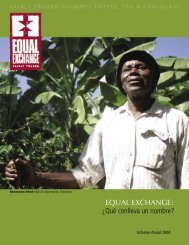TWENTY YEARS TWENTY YEARS - Equal Exchange
TWENTY YEARS TWENTY YEARS - Equal Exchange
TWENTY YEARS TWENTY YEARS - Equal Exchange
Create successful ePaper yourself
Turn your PDF publications into a flip-book with our unique Google optimized e-Paper software.
t w e n t y y e a r s o fI N T E R V I E W W I T H :Blanca RosaMolinaPresident, CECOCAFEN,Nicaragua“Fair Trade and <strong>Equal</strong> <strong>Exchange</strong> havecaused positive change in our lives.The most important area is in landconservation. Fair Trade has allowed us tohave the land and work it. For the smallproducer this is the most important thing.The land is the means of life, our form oflife. Fair Trade has prevented us from losingour land. Instead, we have been able toimprove it, diversify the crops that we growon it, and protect the environment.Fair Trade has also been extremelyimportant for women in Nicaragua. It hasallowed us to organize, to have an effecton politics and our co-operatives. I’m aproducer of coffee and until recently theworld of coffee was a man’s world. Coffeefarming makes up the principal economyof the country; but women did not enterit. Now, we’ve made a major advancein the participation of women. Today,women form a significant portion of coffeeproducers: thirty six percent. We are foundwithin the management structure, weare in the administration. And this is veryimportant. What made this happen wasFair Trade.”Our Co-op SupportersBack in 1986 when <strong>Equal</strong> <strong>Exchange</strong> was importing its first container of coffee, many foodco-ops were already celebrating 10 or 15 years as community-owned businesses. These cooperativeswere pioneers in organic retailing, and the idea of empowering coffee growers andlinking them with their customers in the U.S. resonated with them. As <strong>Equal</strong> <strong>Exchange</strong>started sourcing coffee from small farmers, food co-ops were enthusiastic early supporters.Fern Weiss, currently at the Wedge Natural Foods Co-op in Minnesota, recalls being abuyer at the Cambridge Food Co-op (now Harvest Food Co-op) in the early days of <strong>Equal</strong><strong>Exchange</strong>. “I liked the idea of putting a face and name to the grower. Fair Trade didn’t havethe recognition it has now and we really didn’t know what it meant. We supported <strong>Equal</strong><strong>Exchange</strong> partly because the coffee was organic and healthy for the earth, but also because itseemed like a more spiritually healthy way of doing business. At the time, we didn’t realize itsimportance or how far reaching it would become.”Over the past twenty years, <strong>Equal</strong> <strong>Exchange</strong> and food co-ops across the country havegrown up together, partnering in ways that express their social visions in an increasinglycompetitive natural foods industry. During this time more than 40 food co-op staff membershave visited coffee-growing co-ops on <strong>Equal</strong> <strong>Exchange</strong> delegations to Mexico, Peru, ElSalvador, Guatemala, and Nicaragua. And when <strong>Equal</strong> <strong>Exchange</strong>’s trading partner in theDominican Republic suffered a devastating hurricane, more than 50 food co-ops stepped up,raising more than $7,000 in reconstruction funds. More recently, food co-ops have been keyallies in helping <strong>Equal</strong> <strong>Exchange</strong> create our Domestic Fair Trade program, which adapts ourinternational standards to food grown by U.S. farmers.Just as Fair Trade is about much more than paying a fair price, <strong>Equal</strong> <strong>Exchange</strong>’srelationships with food co-ops are about more than supplying them with delicious chocolate,tea, and coffee. <strong>Equal</strong> <strong>Exchange</strong>, food co-ops and the producer co-ops at the beginning of thechain all participate in a vibrant co-operative economy, where goods are valued for the humanconnections and community that they represent. –Kristin HowardEQUAL EXCHANGE TIMELINEFresh produce at the Community Mercantile Food Co-op located in Lawrence, Kansas.$2.007MAY 1, 1986U.S. customs officials releasethe first shipment of Nicaraguancoffee from the Port of Boston,and <strong>Equal</strong> <strong>Exchange</strong> is born1989International Coffee Agreementexpires - coffee prices dropfrom $1.30 to $0.80 per pound.GREEN COFFEE PRICE PER POUND$1.50$1.00$0.501988 1989












